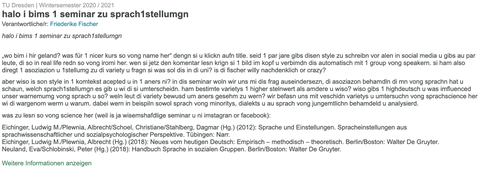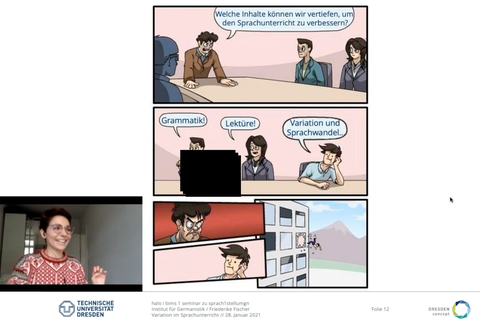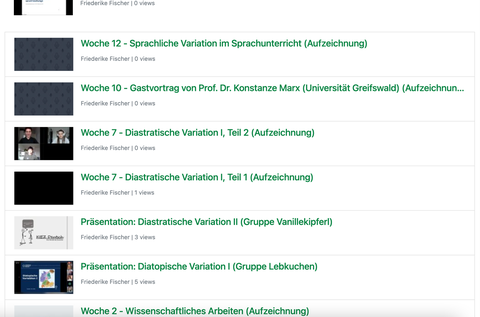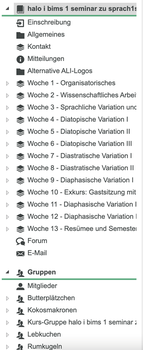„halo i bims 1 seminar zu sprach1stellumgn“: Friederike Fischer, M.A. (#FF1)
Format
Seminar with synchronous and asynchronous elements. The learning content was developed both independently and collaboratively through group presentations, accompanying reading assignments, seminar discussions, and a guest lecture.
Keywords
Linguistics, linguistic variation, attitudes about language, group projects

© Friederike Fischer

© Friederike Fischer

© Friederike Fischer

© Friederike Fischer
Description
Why do certain linguistic varieties have a higher status in society than others? What associations do speakers have in the face of different dialects and styles, and why? Why does something like “High German” exist and what factors influence our perception of different varieties?
As the tongue-in-cheek title of the course suggests, we dealt with these and other questions in the seminar.
The course was divided into three thematic blocks of three sessions each, focused on the main sub-fields of linguistic variation. The first session of the individual topic blocks took place via GoToMeeting. In these video conferences, each topic was first introduced on the basis of a lecture by the teacher, and then questions and ambiguities were clarified and discussed in the plenary session. Recordings of the video conferences were made available via the Videocampus Saxony portal so that the participants could also view and work through the content afterwards.
The other sessions of the thematic blocks consisted of group presentations by the students, in which they were able to consolidate and present what they had learned using concrete examples. The design of the presentations was left up to the students, so a wide variety of creative projects was submitted. The spectrum ranged from PowerPoint presentations set to music to sophisticated videos and podcasts. Like the recordings of the video conferences, the student lectures were also made available via VCS or OPAL, enabling asynchronous learning. The more detailed examination of a concrete linguistic example also served as a possible basis for the written examination performances at the end of the semester.
In addition to the various presentations and plenary discussions, there were also regular reading assignments in which the participants worked with the texts accompanying the seminar on the basis of specific questions. Ambiguities and queries about the reading assignments were discussed primarily in the plenary video conferences, but tools such as Wonder or Padlet were also used to exchange ideas in smaller groups or to work collaboratively on a question.
Another highlight was the guest lecture by Prof. Dr. Konstanze Marx from the University of Greifswald, who in turn gave a session on “Vong” as a form of linguistic variation in social media in the German-speaking world.
Regular and close exchange among students and with the teacher was ensured through group work and regular video conferences. The weekly office hours through Whereby also allowed contact to be maintained beyond seminar time. Spontaneous meetings were also possible, so that the direct exchange was simple and also possible at short notice.
Link to the OPAL course:
https://bildungsportal.sachsen.de/opal/auth/RepositoryEntry/26223312898/CourseNode/102381055026287
Contact
Friederike Fischer
Voting ID
#FF1



